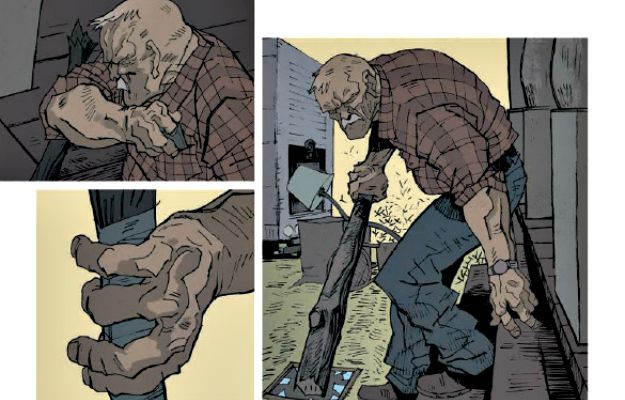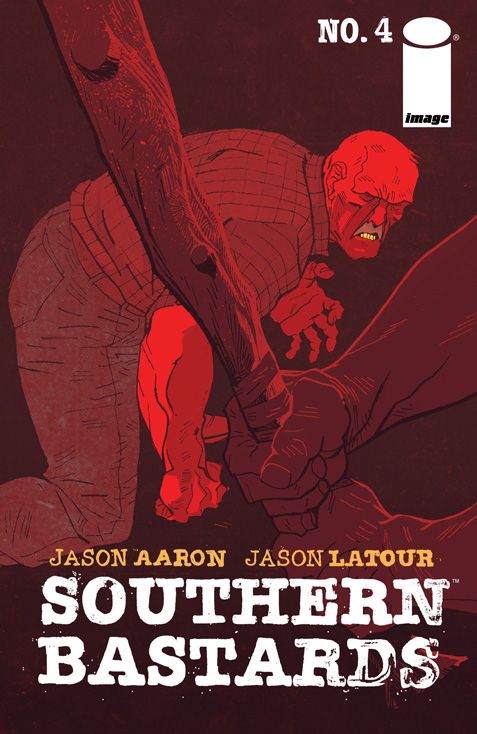[Editor’s note: Each Sunday, Robot 6 contributors discuss the best in comics from the last seven days — from news and announcements to a great comic that came out to something cool creators or fans have done.]
This week saw the first arc of Jason Aaron and Jason Latour's Southern Bastards wrap with the release of issue #4. After spending the past three issues laying the foundation for lead character Earl Tubb to confront Dixie Mafia (and football coach) Boss, readers get what they want--and much much more.
As a native of the South (born, raised and still live in Atlanta), I have a deep appreciation for the story the Jasons aim to tell. It is 2014, but as a man who has sat in traffic in a metropolitan Southern city and witnessed a teenager driving a pickup truck with a giant Confederate flag waving from a pole in his truck bed can tell you, not everyone cares what year it is. It is 2014, but AutoTrader recruited Bo and Luke Duke to sell their new phone-app based platform. Right or wrong, those characters likely typify the South for many people who have never lived here. I think while some of my fellow Southerners live in and relish the wrongheaded trappings of the past (and yet, no, I am not calling the Dukes of Hazard racist), many folks are like me, proud of being from the South, but with no desire to rehash why and how the Civil War was fought. In 2014, there is no such thing as a typical Southerner. Thankfully, there is diversity in the 2014 South.
In a recent CBR Sunday Conversation, Latour said of the series: "We'd been discussing doing a crime fiction thing for a long time because we both have a deep love for that, but we wanted it to be personal if it was gonna be an indie book. We'd been circling this idea of doing a Dixie mafia style book for a long time, and Jason had this idea for a football coach crime boss, that I liked. There's a lot of levels to that, especially if you understand the culture down here. If you take it the wrong way it could seem a little broad, but I think knowing it as intimately as we do, we can add nuance, or use it as a window into some things."
Craw County is a fictional setting for Southern Bastards, and a football coach running a town with an iron fist is the height of escapism undoubtedly. But there is a nugget of reality to the whole fictional construct that resonates with me. In this issue, artist Latour perfectly captures the mixed look of fear and resignation in the town's residents as Earl Tubb appeals to their collective sense of decency to take a stand against Coach Boss.
The fight scenes in this issue are ambitious and cover a great deal of ground--Tubb is not just fighting the present, he is haunted by his past. All of it is laid out on the page in vibrant and bloody color.
At one point, Tubb is on the phone again--leaving messages for someone, and he says the word "love". He also weeps in this issue. Indeed, Aaron and Latour have added nuance to the tale of a town defined by a high school football empire. Judging by the epilogue in this installment, the levels yet to be revealed in this series makes me excited to see what the creators have in store.
I truly cherish this series, mainly due to the passion the creators put in each page--and poured into the text piece that ran in the first issue. Both creators love the South. Aaron, however, no longer lives there and never plans on moving back. Barring a major shift in where my kids and grandkids live, I will likely die in the South. So I feel a special kinship with Latour's text piece. He wrote of moving to New York and then returning to live in the South. There is an anger in Latour regarding folks that give the ignorant image it has in the mind of many. As he wrote: "So this book is for THEM. The assholes you might think Southerners are. The ones were afraid we might really be. This book is designed to bury them sons of bitches."
I hope the Jasons succeed--and I am grateful to be entertained along the way.


